- Home
- Joseph Boyden
Through Black Spruce Page 2
Through Black Spruce Read online
Page 2
I stand up, see white outside the window, a long view of the river and three feet of snow, the spruce like a wrought iron fence in black rows against the white. So cold out today. The sky is blue and high. No clouds to hold any heat.
Dr. Lam wanted to fly him down to Kingston but was concerned he wouldn’t make the journey. He’ll die down there. I watch as snowmobiles cut along the river, following the trail from Moosonee. Their exhaust hangs white in the air. February. The deadest month. The machine that helps him breathe sounds like the even breath of some mechanical sleeping child. A machine hooked up to his arm beeps every second or so. I think it is the machine that tells the staff that his heart still beats.
I hear the pad of footsteps entering the room and I turn, expecting my mother, black hair eight months ago mostly white now so that when I first saw her nothing made sense. But it’s Eva, so large in her blue scrubs, all chubby brown face. I always thought nurses wore white uniforms and silly-looking hats. But in this hospital they dress like mechanics. I guess that’s what they are.
Eva checks his vitals and jots them down on his clipboard. She turns him on his side and places pillows behind to prop him up. She told me it is to prevent bedsores. A month now he’s been here and all they can tell me is he remains in a stable but deeply catatonic state. The chances are slim that he’ll ever wake again. The injuries to his head were massive, and he shouldn’t be alive right now. But is he really alive, lying there? I want to ask Eva as she rubs his legs.
“Come help me, Annie,” she says. “Do the same to his arms. Keep the circulation going. It’s vital.”
“Ever weird,” I say, standing on the other side of the bed, holding his arm in my hands, kneading it.
“What is?”
“Touching him. My whole life I can’t ever remember touching him at all.”
“Get over it.” Eva breathes heavily as she works. She huffs and puffs. I’ve known her all my life and she’s always been fat. Bigger than fat. She is my apple-faced, beluga-sized best friend. “Have you been talking to him?” she asks.
I shrug. “That’s even more weird,” I say. “It’s like talking to a dead person.”
“You better apologize, you,” Eva says. “You will upset him with talk like that.”
When Eva moves on to the next room I sit back down and stare into his face. He looks half the size as when I left last year. The doctors had to shave his long black hair shot with grey. And he looks older now than his fifty-five years. He has so many faded scars on his head, white zigzags against salt-and-pepper fuzz. I can picture him waking up and grinning, his two missing front teeth making him look like a little boy. Mum says he lost all the weight when he went out in the bush on his traplines last summer and autumn. I knew something was very wrong when she said he went out to trap in summer. What was he hunting? A tan?
As if I’ve beckoned her, my mum appears, sitting down in the chair beside me. She passes me a Styrofoam box. “Eat,” she says. “You’ve gotten as skinny as him, Annie.”
“I’m not hungry,” I say.
“They need to check on him,” Mum says, rubbing his head like he’s a gosling.
“Eva was just here, Mum. Trust her. She knows what she’s doing.”
“My show’s on,” she says, picking up the remote.
I’ve got to get out of here. The woman drives me mad with her talk shows and the cheap psychology she gleans from them. She’s even nuttier now that my sister hasn’t come home. Suzanne has been gone two years. Everyone in this place, even my mum, believes she is dead. But I hold out and hope.
It’s so cold outside, the battery on my snowmobile drained again. I yank on the starter cord until my arm feels like it’s going to rip off my body. I flip the choke a couple of times once more, crank the throttle, and on the next pull it rattles to life. Pulling my moosehide hat tight over my ears, I roll out onto the river, the wind so cold my eyes water and the tears freeze on my cheeks. Goddamn it’s hard to be back here.
A couple of people coming over on their machines from the Moosonee side flip waves to me, but I pretend I don’t see them. I need a new ski-doo. I’ve stuffed enough money away from my adventures in New York to get one. Maybe a Polaris. Maybe a Bombardier to keep it Canadian. The trail leads off Moose Factory and onto the river. Moosonee squats on the other side’s bank, its church steeple fingering the sky. The houses run their wood stoves so hard that the smoke hangs white and thick just above, not wanting to dissipate.
I steer right and away from town down the river to the bay. A fifteen-mile trip to my camp. My family’s old goose camp. When I get there, I know I’ll stare out at the frozen white of James Bay stretching off to Hudson Bay, just as I’ve been doing every day since I came back, and truly know I’m living on the edge of the world.
The tide’s coming up, pushing slush along the river’s banks. I stay closer to the middle. It’s so wide here I have a dozen snowmobile trails to choose from. As kids, Suzanne and I would try to swim across but tired before crossing a fraction of it.
I think my cabin’s on fire when I approach, smoke pouring out of the open windows and door, but then I see Gordon sitting dejected in his parka outside on a snowbank. When I stomp inside, I find the wood stove’s flue shut tight. I flip it open and watch the smoke in the stove turn to fire again. Coughing, I grab the pen and paper from the kitchen table, march outside, and hand it to him. “What the hell were you thinking, shutting the flue?” I ask. The poor bastard’s hands are almost blue in the cold. “And why aren’t you wearing any mitts?” I sit down on the snowbank, peel my mitts off, and shove them at him.
His writing is close to indecipherable, his hand shakes so bad. You told me to shut if house got too hot.
“I told you to shut the damper when it got too hot,” I say, “not the flue.” I’m not angry at him anymore, something more like stunned aggravation in my voice. The poor bastard. I help pull his lanky frame out of the snow by yanking him up by the parka. I lead him inside to the smoky warmth.
Although I had planned to, I don’t go back to the hospital the next day. Northern Store is paying big for marten hides this year, so I decided to run a trapline to teach my city Indian, Gordon, a little bit about the bush. We could have taken my snowmobile, but I have him out on snowshoes today, and he’s getting better, remembering to drag his heels and point the toes of the snowshoes up when he walks. The exercise is wicked, having to push through the deep drifts, the world frozen solid but us working so hard that we have to be careful not to sweat. We cut along a creek, checking boxes nailed five feet up the good spruce, baited with pieces of goose, a snare wire to grip the marten’s furry neck when it sticks its hungry head in. I’ve got over a dozen traps along this stretch. All of them are empty. Maybe we’ll have to try a new place.
Gordon and I could have moved into my mum’s when I came back here, dragging him with me, but I knew that setup would all fall apart in a few days. She hates that I’m so far from town, living like a savage on the edge of the bush. She worries a seizure will come while I’m driving my ski-doo and I’ll fall off and die. I’ve lived with these fits my whole life. Still, she worries. I considered renting a place in Moosonee but figured I had a perfectly good camp, and besides, I can’t stand all the stares I get in town now that all of this has come down.
I sit in the snow by the frozen creek and light a cigarette. No way I’m going to come back home just to gain weight and get all depressed. The sky is a high blue, and it’s so cold today, the world is silent. I offer Gordon a smoke. He takes one. He’s not much of a smoker, him, but I’ve learned he likes one once in a while.
“So, Gordo,” I say, looking at his thin face, the sparse whiskers around his mouth frosted white. “What do you make of northern living?”
He nods his head all seriously. Some days I wish he could speak, but there’s something nice about having a friend who never talks back, who’s always forced to listen.
“Would you rather be on the streets of Toronto, or do you
like it better here right now?”
He shrugs, and then points with his mittened hand at the ground he sits on.
“I’m torn,” I say. “Maybe we’ll head back to NYC after spring goose hunt. I’m going to keep in shape, get more work.”
He nods.
I know what the cold will do to my skin, dry it out and wrinkle it so I look twice my age after one winter. I’m moisturizing three or four times a day now, won’t let it happen. Jesus, listen to me. My uncle Will, he’d get a kick out of me now. His tomboy niece is really just a sissy girl.
“Let’s go, Gordo,” I say, pulling myself up. “More traps to check. Not much light left.”
3
FOR YOU
Moosonee. End of the road. End of the tracks. I can sense it just beyond the trees, nieces. It’s not so far away through the heavy snow. That place, it can be a sad, greedy town. You fall into your group of friends, and that’s that. Friends for life, minus the times you are enemies. Not too many people around here to choose from for friends, or for enemies. So choose right. In this place, your people will die for you. Unless they’re mad at you. If you are on the outs with a friend, all bets are off. You don’t exist. I’m down to my last couple of friends and have been for years. Maybe it’s like anywhere, but we’re some vengeful bunch. I blame it on the Cree being a clan-based people. Each clan has its own best interests in mind. And whenever you have your own best interests in mind, someone gets left out and gets angry.
I need, though, to back up a little, me. For you, Suzanne. For you, Annie. I am the one who watched out for you from a distance since your earliest years when your father left your mother to do whatever he went to do. I am the first to say I was not perfect at this job. But I worried for the both of you.
In my waking world, I was not worthwhile. I hadn’t been for years. Booze will do that to a man. But booze is not the root of the problem. Just a condition. When you lose something, something that was your whole world, two choices present themselves. Dig through the ash and burnt timber, through the bits of ruined clothing and blackened shards of dinner plates and waterlogged photo albums that was the sum of your life, and find something inside you that makes you want to go on. Or you allow that black pit that is born in the bottom of your belly to smoulder, and spend your days trying to dampen it with rye.
I am a keeper of certain secrets, just as your mother, Lisette, is the keeper of her own. Me, I don’t know where this comes from. The Mushkegowuk people love nothing more than to chatter like sparrows over coffee in the morning, over beer at night. There’s something unifying, something freeing about rolling around in the dirty laundry of your neighbours, picking it up and pointing out the stains, sniffing it almost gleefully for the scent of grief.
I need to share a secret with you. Just one right now. But it’s the one that hurts the most. Your grandfather, Annie, he wanted your ability for visions but only gained it partially. He didn’t want or care for what you have, Suzanne, your beauty, your charisma. But I wanted the gifts that both of you girls possess. Wanted them full on. I fancied myself a chief in an earlier life, a man of the people, leading them through troubled times, photographed like Sitting Bull, my profile stern in its wisdom. But I didn’t get your gifts. Or maybe I did, only just a little. Not enough.
Months before I watched you, Annie, leave with your friend Eva to go to Toronto, something happened that maybe pushed us all over the edge. Suzanne, you’d been gone from home over a year at that point. Many moons, eh? Too many. Where’d you go? Call you mother. She worries.
I need to tell you both about that night. Me, I like drinking at my own kitchen table, having friends come over. We can smoke in the house and drink as much as we want. I rarely drank anywhere else. Me, I’d become a homebody over the years when I wasn’t out in the bush. I’d even watch TV once in a while when I got bored. History Channel. Bravo. Discovery Channel. One show called Crime Scene Investigation. Good stuff. But one night, Joe invited me over, so I went. Joe, we call him Chief, Chief Joe Wabano, although he’s never officially held the title. He’s got the big belly of a chief and the paycheque from driving tugs up the bay to the isolated communities. And when he gets drunk, he likes to let people know exactly what he’s thinking.
I must have been bored that night. My truck wouldn’t start so I walked the few miles into town to see Joe. Cold spring evening, and I remember how good it felt to walk, buzzed already from a few lonely drinks at home, the stars up above winking at me. A car passed me as I made it to the bridge by Taska’s, and as it slowed I saw it was Marius driving, two big white friends stuffed in with him. Suzanne, you and Gus were missing at that point, had dropped off the face of the world, it seemed. The Netmakers were blaming us, and we blamed them. But I didn’t think twice about all that at the time.
Me and Joe and his woman, we phoned Gregor, the white schoolteacher and famous pervert, to join us when we got into our drinks pretty good. But it was a weeknight, and he had to teach the next morning. Too bad. Gregor would have driven me home if he’d showed up. I remember feeling restless at Joe’s, like I knew a snowstorm was coming and I was unprepared. You’ve got that gift, Annie, but much stronger than me, a gift that pops up in our family once in a while. It comes with your seizures, the ability to see into the future, and maybe, if you develop it, to heal. But you’re going to have to work on it, and it’s not like you can enrol at Northern College to learn what you need. Me, I pity your road. It’s lonely. Few people will ever appreciate your gift.
I stayed as long as it took to drink a handful of rye and gingers before I told Joe I was tired out. When I saw he was tired, too, I told him walking home would be good for me. I walked Ferguson Road along the Moose River, the water flashing its nicest bits in the moonlight to my left, the black water pushing itself down into James Bay. I cut across the bridge again and onto Sesame Street, nicknamed for all the kids that live and play on it summer and winter.
I thought I felt the grandfathers in my step that night, the town behind me now, the scent of the dump up ahead on the gravel road. A crisp night that whispered of summer. The flash of headlights somewhere far down the road to my back made me want to step into the bush. I knew, nieces, but I didn’t listen to my gut. I kept walking. The car gunned it behind me, then slowed when I saw my own shadow on the gravel ahead. It passed, then turned and came back so that its lights blinded me. Three men climbed out, the car idling. They stepped into the headlights. Three big men.
“Wachay there, Will.” I recognized Marius’s voice. My stomach dropped out from me. “Something I’ve been meaning to ask you,” he said. I could tell by the voice that he’d had more to drink than me. “Where’d that little bitch niece of yours disappear to with my brother?”
“Don’t you call her that,” I said. I felt sparks behind my eyes. Marius walked toward me and I clenched my fists. I knew what was coming, nieces, but I didn’t know at the time why it was coming. I’d done nothing to him. He got up close enough to me I could smell his leather jacket. He looked back to his friends as if to say something and then used the momentum of turning back to swing his fist into my face, white light filling my eyes as his knuckles squashed my nose. I fell backwards like a tree.
I lay on my back, the gravel sharp beneath my head, the sky above me like it was full of northern lights, and watched as the two white guys with him stared down at me. I could tell even by their silhouettes that they were ugly like only white guys who’ve been raised like dogs can be. They began to kick me, and I remember the sound of my ribs cracking, of my head being shocked so that I worried I’d die.
Those Mohawk down south claim that a warrior doesn’t cry out when he’s tortured then slow-roasted over a fire. I’m no Mohawk, me. I screamed with each kick, my head splitting open, the blood choking down the back of my throat until my cries became gags. When his friends were done, through my eyes swelling shut I saw Marius bend down. He straddled me, sat on me with his full weight and leaned to my ear, whispered with his stinking
breath, “I can kill you any time I want. And I will, one day soon.” I felt his breath on my earlobe.
I don’t know how long I lay there. Something, someone maybe, told me that I eventually had to surface if I was going to live, and believe it or not, it was a tough decision to make. For me, my life’s been hard, and sometimes I’m so tired out from losing the things I love that it feels easier to just give up and slip away.
A voice I knew, the voice of my father, talked to me, and in my head I saw him squatting beside me in the black, on his haunches, his one real leg bent under him, his wooden prosthesis straight out in front like one of those fancy Russian dancers.
“It’s not you that you live for,” he said to me in Cree. “It can’t be. It’s the others.” Not very specific, but I knew who he was talking about.
“What do I got to give to anyone?” I asked. I could tell he was looking down at me, staring at my wounds. He didn’t answer my question.
When he got up to go, I did too. I did the same as he did, floating away from the ground and becoming a night mist that dissolved into the black sky.
But this is not how I entered into the dream world, nieces. I just got a taste of it then. I didn’t enter the dream world for many more months. After the beating, I remember emerging from my hibernation slow, blinking my eyes to the light of bright sun through a window beside me, the whoosh and hiss of some machine standing guard by my bed. I remember not smelling so good, me. Something like rot. The beep of another machine when I closed my eyes to the light. My head thumped. I dreamed I was a sturgeon on river’s bottom pushing up stones with my nose for crayfish. I remember being prodded by doctors, and I remember slipping back down to the bottom of that warm river.

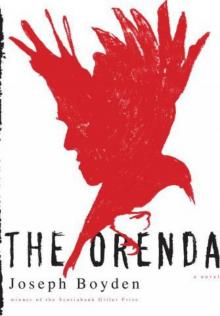 The Orenda
The Orenda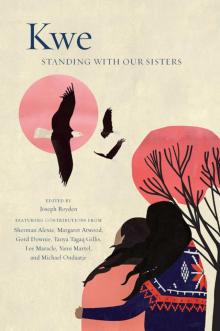 Kwe: Standing With Our Sisters
Kwe: Standing With Our Sisters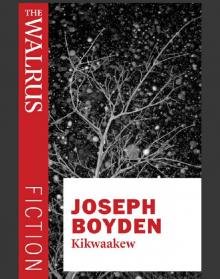 Kikwaakew
Kikwaakew Through Black Spruce
Through Black Spruce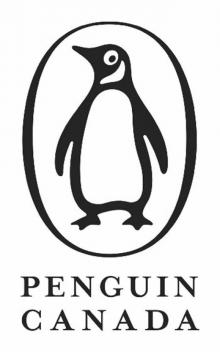 Three Day Road
Three Day Road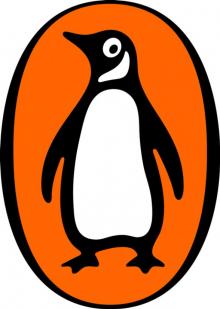 Born With a Tooth
Born With a Tooth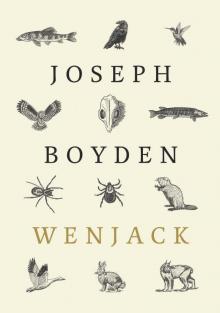 Wenjack
Wenjack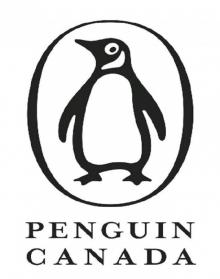 Louis Riel and Gabriel Dumont
Louis Riel and Gabriel Dumont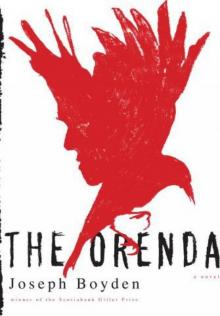 The Orenda Joseph Boyden
The Orenda Joseph Boyden